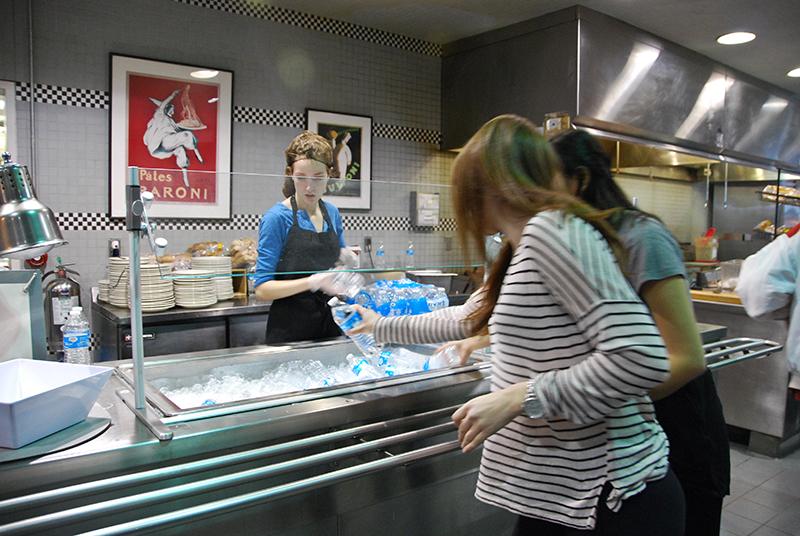Oberlin Water Main Breaks
College seniors Rachel Grossman and Hope Kassen grab bottled water from a well in Stevenson Dining Hall as College senior Erin Amlicke restocks. A water main leak last Sunday forced the city of Oberlin to issue a boil advisory.
March 13, 2015
Water bottles filled the tables of Stevenson Dining Hall, the recesses of recycling cans and the minds of thirsty students after a pipe break placed the city under a boil alert from early Sunday morning until late Monday afternoon. The leak, located a quarter-mile north of state Route 511, near the Oberlin High School softball field, came from a nearly 8-inch crack in a 10-inch main. The large size and inaccessible location of the leak caused the entire Oberlin city water system to depressurize.
Water Superintendent Jerry Hade said leaks aren’t unusual, but are normally small and caught quickly.
“We have a leak about 15 times a year, and most of them go unnoticed,” Hade said. “If we have to go out and shut down an area, those [that do it] are really the only people that know because we put out notices. In this case, it drained our towers. The other 14 a year might come out on the street, or someone finds it right away. We valve it off and notify the people affected by Code Red.”
Hade explained that the city is required to issue a boil alert any time the entire system is depressurized. Officials gathered several water samples from around the city, which were incubated for 24 hours to test for any biological waste. The samples tested clean, but the boil alert was still needed as a precautionary measure.
The last time the entire city went under a boil alert was in 2003. Since then, the same line has broken twice, but the city has responded quickly, allowing the leaks to go unnoticed by residents.
Hade said leaks like these highlight the importance of regularly replacing water mains.
“You’re always going to have leaks; that’s just part of the job,” Hade said. “But what we have been doing since I have been here is replacing water mains that are older or of high importance. We have been doing that to the tune of $350,000 a year. That is something we are proud of, and a lot of cities are not doing that, but in Oberlin, we are.”
The alert in 2003 occurred during a holiday weekend; students were concerned by the administration’s slow response and notification, according to an article written at the time, “Latest Water Crisis Bedevils College” (The Oberlin Review, April 25, 2003). This time, the College responded to the incident by emailing students Sunday morning and shortly afterward placing signs near all sinks, drinking fountains and bathrooms.
“I think we handled this one really well, and I like to think that we learned from that experience in 2003,” said College President Marvin Krislov.
On Monday morning, ResEd placed water for students in all of the dorms and asked students in Village Housing to boil their own water. Stevenson Dining Hall stayed open for lunch and dinner, but served food on paper plates and placed out-of-order signs on the soda machines, distributing water bottles instead. OSCA students were given two meal swipes because the co-ops could not wash dishes or food under the boil advisory.
Several events were canceled and buildings closed, including Philips gym, which shut its doors for all of Sunday. On Monday, the gym reopened, and containers of water were placed in both the cardio area of the gym and the weight room. Only the grocery section of DeCafé was open on Sunday. The café portion did not reopen after the advisory was lifted Monday, and instead started functioning normally on Tuesday.
















